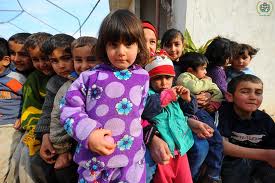 The UN refugee agency yesterday said that one month after the United Nations issued an appeal for $84 million to help Syrian refugees in Jordan, Lebanon, Turkey and Iraq, only 20 per cent of the funds had been received.
The UN refugee agency yesterday said that one month after the United Nations issued an appeal for $84 million to help Syrian refugees in Jordan, Lebanon, Turkey and Iraq, only 20 per cent of the funds had been received.
This is a summary of what was said by UNHCR spokesperson Melissa Fleming – to whom quoted text may be attributed – at the press briefing, on 20 April 2012, at the Palais des Nations in Geneva.
One month after the United Nations and its humanitarian partners issued an appeal for US$84 million to help Syrian refugees in Jordan, Lebanon, Turkey and Iraq, less than twenty per cent of the funds have been given. Of the 34 organisations that have appealed for funds under the Syria Regional Response Plan, only eight have received funding to date totaling US$15.6 million dollars.
Agencies that provide lifesaving support need the funds to be able to respond to the urgent humanitarian needs. According to UNHCR and its partners in the region, both the refugees and the countries hosting them are beginning to show signs of strain. Many refugees arrived with little or no financial resources, so are mostly reliant on the efforts of the host community and organizations dedicated to supporting them.
Over 61,000 Syrian refugees are being assisted in the region (Lebanon: 21,000, Jordan: 13,751, Turkey: 23,971 and Iraq: 2,376). Of this number, over 45,000 have been registered by the authorities and UNHCR. They have all maintained an open borders policy for Syrian refugees.
Despite the lack of funding, the UN and its partners continue to implement essential programmes to assist the refugees and support their host communities.
Highlights of the programmes led by UNHCR include the airlifting of tents and blankets to Turkey, a cash assistance programme in Jordan, outreach programmes to identify the most vulnerable in Jordan and Lebanon and rehabilitation of homes and community centres in Jordan and Lebanon.
Children are particularly badly affected by the crisis, with many showing signs of trauma and grave distress. In Turkey, Jordan and Lebanon the governments are actively encouraging the enrollment of children in schools. UNICEF is supporting education programmes, psychosocial support and child friendly spaces in Jordan and Lebanon.
Food and basic household items are a key concern for many refugees who have little or no financial resources. UNHCR has provided food and household items to over 30,000 Syrians in Jordan and Lebanon. WFP is providing food assistance to refugees in Jordan and has reached an agreement to start operations in Lebanon.
Numerous NGOs, including Caritas, the Jordan Health Aid Society and the International Medical Corps are supporting healthcare for Syrian refugees in Jordan and Lebanon. UNICEF is providing immunization coverage and care. NGOs are also playing an important role in community outreach.
The Syria Regional Response Plan outlines the response needs for Syrian refugees who have fled the country since March 2011. The plan is an inter-agency framework led by UNHCR and the result of a coordinated effort between seven UN agencies, 27 national and international NGOs and host governments.
UNHCR

Leave a Reply
You must be logged in to post a comment.